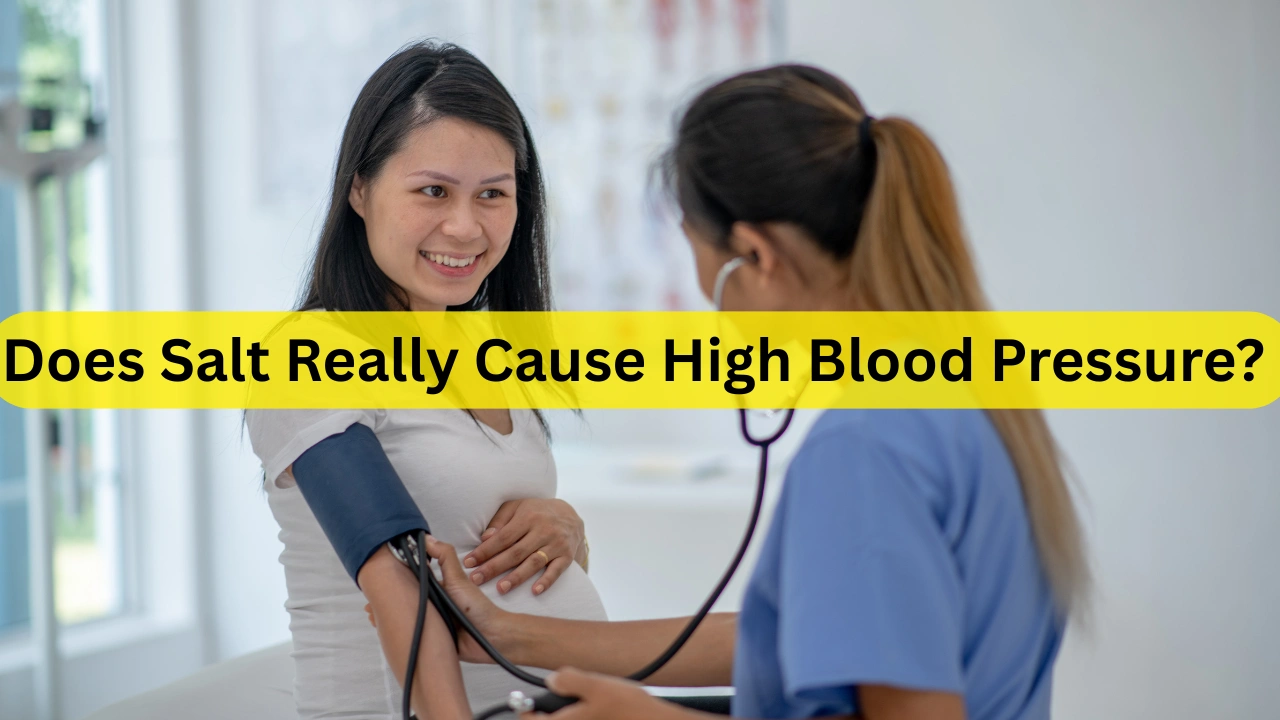High blood pressure (hypertension) is a leading risk factor for heart disease, stroke, and kidney damage. Managing blood pressure is critical for reducing these risks, and many people turn to dietary changes, including reducing salt intake, as a way to help.
However, the question remains: Does salt really cause high blood pressure? In this article, we will explore the relationship between sodium and hypertension, the role of salt sensitivity, and the truth about sodium’s impact on your health.
Sodium, often found in salt, has long been linked to high blood pressure, but recent research has shown that the situation may not be as clear-cut as once believed. Understanding how salt affects blood pressure, and considering other factors such as genetics and lifestyle, is essential to making informed decisions about your health.
How Salt Affects Blood Pressure
The Mechanism Behind Sodium and Blood Pressure
Salt, particularly sodium, plays a significant role in the regulation of fluid balance in the body. When you consume too much sodium, your kidneys struggle to get rid of the excess, leading to fluid retention. This extra fluid increases the volume of blood in your bloodstream, which can result in higher blood pressure.
- Salt and Fluid Retention: High sodium levels cause the body to hold onto more water, increasing the amount of fluid circulating in the blood vessels, leading to a rise in blood pressure.
Does Salt Increase Blood Pressure in Everyone?
While the relationship between salt and high blood pressure is well-established, not everyone responds to salt in the same way. Some individuals are more sensitive to sodium than others, a condition known as salt sensitivity.

People with salt sensitivity experience a greater increase in blood pressure with higher sodium intake, while others may not see any noticeable changes.
- Genetic Factors: Your genetic makeup plays a significant role in whether or not you are salt-sensitive. Salt sensitivity can be influenced by factors like age, ethnicity, and the presence of other conditions such as obesity.
Is Salt the Main Culprit Behind Hypertension?
The Salt Hypothesis vs. Other Factors
For decades, salt restriction has been considered one of the primary strategies for reducing high blood pressure. However, new research suggests that while salt can contribute to hypertension, other dietary and lifestyle factors may be just as important.
- The Role of Sugar and Processed Foods: Diets high in sugar, refined carbohydrates, and processed foods contribute significantly to elevated blood pressure. These foods can cause insulin resistance, which in turn leads to higher blood pressure. It’s important to consider the whole dietary pattern, rather than focusing on salt alone.
The Role of Other Dietary Factors (Sugar, Processed Foods)
A high-sugar diet, particularly one rich in fructose, can increase the risk of hypertension by causing inflammation and promoting fluid retention. Similarly, the consumption of processed foods that are often high in both salt and unhealthy fats further elevates blood pressure.
The Role of Salt Sensitivity in Hypertension
What is Salt Sensitivity?
Salt sensitivity refers to the degree to which an individual’s blood pressure is affected by sodium intake. While most people can consume salt in moderate amounts without significant changes in their blood pressure, those with salt sensitivity may experience a sharp increase in blood pressure with higher sodium consumption.
- How It Affects Hypertension: For salt-sensitive individuals, even small increases in sodium can lead to significant increases in blood pressure, making them more susceptible to hypertension-related health risks.
How to Identify if You Are Salt Sensitive
If you experience an increase in blood pressure when consuming salt or foods high in sodium, you may have salt sensitivity. Some ways to determine salt sensitivity include:
- Monitoring your blood pressure after reducing salt intake
- Consulting a healthcare provider for tests or guidance
Common Myths About Salt and Blood Pressure
Does Cutting Salt Always Lower Blood Pressure?
While reducing salt intake can be beneficial for those with salt sensitivity, it is not a one-size-fits-all solution. Some people may not experience significant changes in blood pressure from salt reduction alone, especially if other lifestyle factors such as diet, exercise, and stress management are not addressed.
- Myth: Cutting all salt from your diet will automatically lower blood pressure.
- Fact: While reducing salt is beneficial, a holistic approach that includes exercise, a balanced diet, and stress management is crucial for long-term blood pressure control.
The Impact of Different Types of Salt
Many people believe that sea salt or kosher salt is better for blood pressure than regular table salt. However, the sodium content in these salts is essentially the same. While some varieties of salt may contain trace minerals, they do not significantly reduce the risk of high blood pressure.
- Myth: Sea salt or kosher salt is better for blood pressure.
- Fact: All types of salt, including sea salt, contain sodium, which can raise blood pressure if consumed in excess.
Can You Have Too Little Salt in Your Diet?
The Risks of Too Much Salt Restriction
While high sodium intake can lead to high blood pressure, restricting salt too much can also have negative health effects. Sodium is essential for proper body function, including nerve transmission, muscle contraction, and fluid balance.
Too little sodium can lead to hyponatremia (low sodium levels), causing symptoms like dizziness, confusion, and fatigue.
- Balance Is Key: The goal should be to consume a moderate amount of salt, rather than eliminating it entirely. The recommended daily intake of sodium for adults is around 2,300 milligrams, but most people consume much more.
What is the Optimal Amount of Salt for Your Health?
A moderate amount of salt is necessary for maintaining health. The general recommendation is to consume no more than 2,300 mg of sodium per day (roughly one teaspoon of salt), but individuals with certain health conditions, such as hypertension, may benefit from consuming less.
- Healthy Balance: Focus on whole foods, minimize processed foods, and consume sodium in moderation to maintain optimal health.
Alternative Approaches to Managing Blood Pressure
Follow a Heart-Healthy Diet (DASH Diet)
The DASH (Dietary Approaches to Stop Hypertension) diet focuses on increasing the intake of heart-healthy foods such as fruits, vegetables, whole grains, and lean proteins while reducing sodium, unhealthy fats, and sugars. This diet has been shown to be highly effective in lowering blood pressure.
- Key Recommendations: Aim to eat plenty of leafy greens, whole grains, low-fat dairy, and lean meats to support heart health.
Regular Physical Activity
Exercise is one of the most effective ways to lower blood pressure. Aerobic exercises like walking, swimming, and cycling help improve circulation, strengthen the heart, and reduce blood pressure.
- Recommendation: Aim for 30 minutes of moderate-intensity exercise most days of the week.
Stress Reduction Techniques
Chronic stress is a significant contributor to high blood pressure. Practices like meditation, deep breathing, and yoga can help lower stress levels and improve blood pressure.
- Recommendation: Incorporate relaxation techniques into your daily routine to reduce stress and support heart health.
Conclusion
Salt plays a role in high blood pressure, but it is not the sole cause. While reducing salt intake is beneficial for many people, it is equally important to focus on other lifestyle factors such as diet, exercise, and stress management.
| Homepage | uhmychart.org |
A balanced approach that includes moderate salt consumption, along with healthy eating and regular physical activity, is key to maintaining healthy blood pressure levels.
Frequently Asked Questions (FAQs)
How does salt affect blood pressure in different people?
Salt sensitivity varies from person to person. Some individuals experience a significant rise in blood pressure with high sodium intake, while others are less affected.
Is it enough to simply reduce salt to lower blood pressure?
Salt reduction is beneficial, but a holistic approach that includes a balanced diet, regular exercise, and stress management is essential for long-term blood pressure control.
Can I still eat salty foods without raising my blood pressure?
Yes, if consumed in moderation and as part of a balanced diet. Focus on whole, unprocessed foods and limit sodium from packaged foods.






